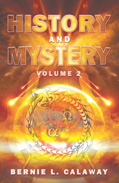
 |
What is mankind’s purpose? How do scripture and mythos intertwine with how one sees the material world and the ramifications of one’s actions toward an apocalyptic event? Interestingly, all the religions of the world have deep, entrenched beliefs regarding end times, what happens after death, and the key players that live their mortal lives creating a model after which humans can emulate their lives and deepen their understanding.
Though most encyclopedia anthologies serve to define, as the author states, Callaway’s work is incredibly comprehensive in that it goes to great lengths to provide key insight and commentary on the encyclopedia entries. Rather than drive audiences in circles with convoluted language, Callaway takes incredibly complex stories that are featured most prominently in scripture sources, such as the Bible, and provides a simplified yet working explanation for the audience to build from. Undoubtedly, a reader is not going to become a scholar in the study of Abel or Abdon. However, their entries in the encyclopedia will become a catalyst to not just cutting to the core of their role but giving readers the spark, clarity, and desire to learn more.
When one thinks of an encyclopedia, facts come to mind. Nevertheless, when stating the facts of the world’s anthropological beginnings, the needle doesn’t move much. In Callaway’s work, the most intriguing aspect is his ability to weave together more than just religion. Audiences will gain enriching knowledge on everything from timeline discrepancies between different cultures and religions to probings of iconic figures like Adi Shankara in Hinduism, powerful words like ahimsa in Buddhism, and even from the inclusion of the Native American Book of the Hopi. Despite the work coming from a distinctively Christian bias, as the author himself acknowledges, there is simply an abundance of questions that pinball around the human mind. Existential questions, the universe’s greatest paradoxes, etc. At the core of the work, Callaway encourages the reader to not settle for the status quo and simply investigate and question, to be introspective and gain a fuller understanding before coming to conclusions.
For the seeker who wishes to have an aggregated resource to begin his examination of the Bible, Callaway’s anthology goes beyond one’s wildest imagination. Where there are terms that are commonly hard but rarely understood, like “born again,” “born again virgin,” or “bread and cheese test,” there is also more cosmic terminology like “Brahman.” Whether one is focused on examining the world from a universal standpoint or honing in on the microscopic details, the likelihood is that Callaway will have a relevant entry.
Above all else, Callaway’s work is fluff-free with a seemingly steady yet infinite source of knowledge—both expected and unexpected—even for the scholars who are versed in these discussions. Ranging from biblical figures to Dante’s Inferno and contemporary authors like Dan Brown, Callaway’s encyclopedia has entries for anything that even remotely pertains to Christianity. For its sheer breadth and comprehensive quality, Carraway’s efforts are commendable and a meaningful read for anyone seeking to dig deeper and gain a greater understanding of universally embedded themes and beliefs as they pertain to Christianity, mysticism, apocalypticism, and more.